Astrology and divination have always held a captivating allure for humanity, offering glimpses into the mysteries of the universe and our place within it. In ancient Rome, these practices held a special significance, shaping the lives and decisions of individuals and the destiny of the empire itself. Unveiling the Secrets of the Stars takes us on a journey through the rich tapestry of ancient Roman beliefs, astrological practices, and divination methods. From the role of astrologers and the symbols they studied to the various types of horoscopes and their influence on daily life, this article delves deep into the captivating world of astrology and divination in ancient Rome. Join us as we unravel the secrets and uncover the truth behind this ancient and intriguing practice.
Ancient Roman Beliefs and Astrology
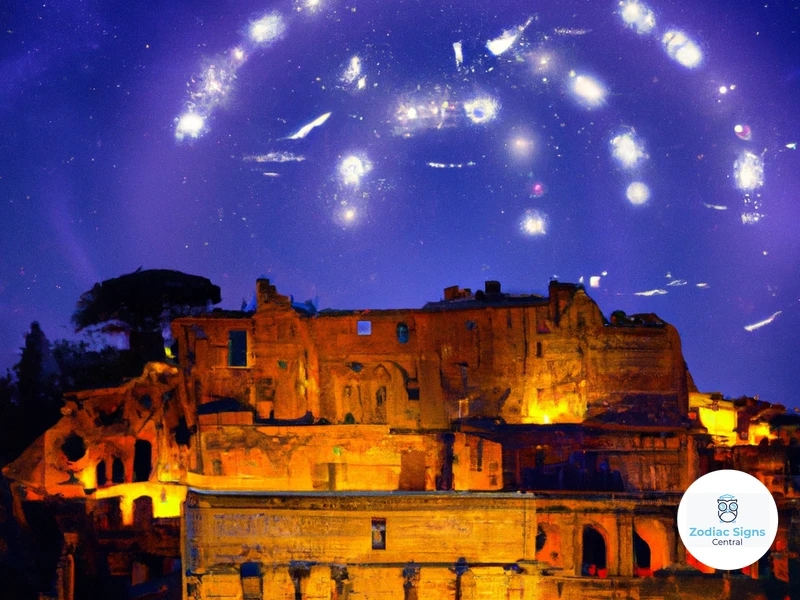
Ancient Roman beliefs were deeply intertwined with astrology, with the Romans believing that the positions and movements of celestial bodies held significant influence over human affairs. They believed that the gods communicated their will through these celestial signs, and therefore astrology played a crucial role in understanding and predicting events. The Romans used astrology to gain insights into various aspects of life, including personal fortunes, relationships, and even the destiny of the empire itself. They believed that each individual had a guardian spirit or genius, who was determined by their birth chart and influenced their personality and fate. Astrology was not only used for predicting the future but also for understanding one’s character traits and making important decisions. The Romans associated each zodiac sign with specific attributes and qualities, and these links were used to interpret an individual’s personality and destiny.
The zodiac signs played a significant role in ancient Roman astrology. Each sign was associated with specific elements, planets, and characteristics. For example, Aries was associated with the element of fire and the planet Mars, representing qualities such as courage and leadership. Taurus, on the other hand, was associated with earth and the planet Venus, symbolizing stability and sensuality. The Romans believed that the alignment of these signs at the time of birth influenced an individual’s personality and destiny. Roman astrologers also had a special interest in celestial phenomena such as comets and eclipses, considering them as important omens or warnings from the gods. Astrology was deeply ingrained in Roman beliefs and played a central role in shaping their worldview and decision-making processes.
Astrological Practices and Techniques
Astrology in ancient Rome encompassed various practices and techniques that were used to decipher the meanings and influences of celestial phenomena. One prominent practice was **Horary Astrology**, which involved casting a chart based on the time a specific question was posed. This chart would then be analyzed to provide answers and insights. **Natal Astrology** focused on creating birth charts that mapped out the positions of the stars and planets at the time of an individual’s birth. These birth charts were used to understand one’s personality traits, strengths, weaknesses, and potential life outcomes. **Mundane Astrology** dealt with the interpretation of celestial events and their impact on society and the state. It analyzed the planetary alignments and positions to predict events and trends in the wider world. These astrological practices relied on complex calculations, astrology tables, and detailed knowledge of the zodiac signs and planetary movements. Astrologers would interpret the gathered data and provide guidance and predictions to individuals and even the ruling elite. While these practices had their skeptics, astrology held a firm place in ancient Roman society and was widely consulted for its insights and guidance.
Horary Astrology
Horary astrology was a specific branch of astrology that gained popularity in ancient Rome. This form of astrology focused on answering specific questions or concerns posed by individuals. It was believed that the positioning of celestial bodies at the exact moment a question was asked could provide insight and guidance. Horary astrologers used a variety of techniques to interpret the charts and provide answers. These techniques included using planetary rulerships, determining the significator or ruling planet of the question, and analyzing the aspects and houses in the chart. The time and place of the question were also considered to be crucial factors in Horary astrology. The astrologer would cast a chart for the exact moment and location of the query, using it as a snapshot of the heavens and the energies present at that particular moment. This chart would then be carefully analyzed to provide the seeker with a response to their question. Horary astrology was often used for practical matters such as determining the outcome of business ventures, finding lost objects, or even assessing relationship compatibility. It offered individuals a way to seek guidance and make decisions based on celestial influences and alignments. While Horary astrology may seem mysterious to some, it was an integral part of ancient Roman astrology, providing individuals with a glimpse into the workings of the cosmos and their place within it.
Natal Astrology
Natal astrology, also known as genethliacal astrology, focused on the interpretation of an individual’s birth chart to gain insights into their personality traits, potential, and destiny. The ancient Romans believed that the positions of the planets and stars at the time of a person’s birth determined their unique characteristics and influenced their life’s trajectory. The birth chart, also referred to as a natal horoscope, provided astrologers with a detailed map of the heavens at the moment of a person’s birth. This chart was divided into twelve houses, each representing different areas of life such as career, relationships, and health. Astrologers analyzed the positions of the planets in these houses, as well as their aspects and relationships to one another, to interpret the individual’s strengths, weaknesses, and life path. For example, someone with their Sun in Virgo may exhibit traits such as practicality, attention to detail, and a strong sense of responsibility. By understanding the interactions between the planets and the signs, astrologers in ancient Rome could provide individuals with valuable guidance for making decisions and understanding their own unique predispositions. Natal astrology allowed the ancient Romans to gain a deeper understanding of themselves and navigate their lives in alignment with the celestial influences that they believed governed their fate.
Mundane Astrology
Mundane astrology was a branch of astrology that focused on the study of celestial patterns and their impact on world events and society as a whole. Unlike horary astrology, which dealt with specific questions and individual lives, mundane astrology looked at broader trends and the collective destiny of nations and empires. Astrologers would analyze the positions of the planets, the lunar nodes, and other celestial bodies to make predictions about political affairs, natural disasters, and social developments. They believed that these cosmic alignments and configurations could provide insights into the rise and fall of empires, the outcome of battles, and even the success or failure of crops.
Mundane astrologers in ancient Rome would create annual horoscopes for key dates and events such as the accession of emperors, the founding of cities, or the declaration of important treaties. These horoscopes would guide the rulers and decision-makers in understanding the potential challenges and opportunities they would face. For example, if a certain alignment suggested conflict or diplomatic tensions, the rulers could take preemptive measures or alter their plans accordingly. The insights provided by mundane astrology were considered invaluable, and astrologers often held influential positions in the Roman court, advising the emperors and offering guidance in times of uncertainty.
Patterns and cycles observed in mundane astrology were not only limited to political and social matters. They also encompassed natural phenomena like weather patterns, earthquakes, and famines. The Romans believed that cosmic energies influenced the natural world just as they affected human affairs. By studying the positions and movements of celestial bodies, astrologers attempted to predict and understand these natural occurrences. Their observations and interpretations were recorded in meticulous detail, forming a wealth of knowledge that informed the decisions of rulers, priests, and even farmers.
Mundane astrology, with its focus on the collective destiny and overarching themes, offered a unique perspective on the interconnectedness of celestial and earthly events. It was a tool through which the Romans sought to understand, navigate, and perhaps even gain a sense of control over the intricate web of forces that shaped their world. To this end, the study of mundane astrology played a crucial role in the political, social, and natural fabric of ancient Roman society.
Common Astrological Symbols and Significance
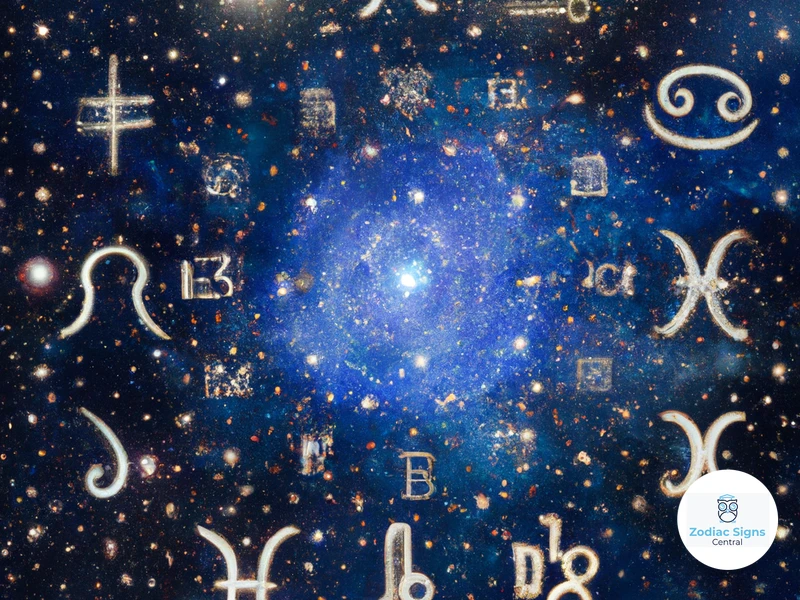
In ancient Roman astrology, various symbols held significant meaning and were used to interpret celestial patterns and their effect on human lives. These symbols, whether connected to the zodiac signs or celestial phenomena, had deep significance in understanding the influence of the stars. Here are some common astrological symbols and their significance in ancient Rome:
1. The Sun (☉): Representing vitality, energy, and leadership, the Sun was considered the most important celestial body in astrology. It symbolized power and influence, and its placement in a birth chart indicated the individual’s core essence and ego.
2. The Moon (☽): Associated with emotions, instincts, and the subconscious, the Moon symbolized intuition and the nurturing side of one’s personality. Its phases and positions in the birth chart were used to understand emotional patterns and inner needs.
3. The Planets: Each planet had its own symbol and represented different aspects of life. For instance, Mercury (☿) symbolized communication and intellect, Venus (♀) represented beauty and love, Mars (♂) symbolized aggression and passion, Jupiter (♃) signified expansion and opportunity, Saturn (♄) represented structure and limitations, and so on. The positions of these planets in relation to the zodiac signs were used to determine an individual’s strengths, challenges, and areas of growth.
4. Zodiac Signs: The twelve zodiac signs each had their own symbol and represented distinct personality traits and characteristics. For example, Aries (♈) represented courage and assertiveness, Taurus (♉) symbolized stability and determination, Gemini (♊) represented adaptability and curiosity, and so on. These symbols helped astrologers interpret an individual’s personality and potential based on the zodiac sign associated with their birth.
5. Aspects: Aspects depicted the angles between planets and their potential influence on each other. They were represented by lines connecting the symbols of the planets. For example, a conjunction (☌) indicated a strong merging of energies, while a square (□) represented tension and challenges. These aspects helped astrologers understand the dynamics and interactions between different planetary influences.
Understanding these astrological symbols was vital in creating birth charts, predicting future events, and providing guidance in decision-making. By examining the positions and relationships between these symbols, astrologers gained insight into an individual’s potential, strengths, and challenges, aiding them in navigating various aspects of life.
The Role of Astrologers and Diviners
Astrologers and diviners held a significant role in ancient Roman society, as they were seen as intermediaries between the divine and human realms. They were highly respected and sought-after individuals who possessed deep knowledge and understanding of astrology and divination practices. Astrologers were responsible for studying the movements of celestial bodies and interpreting their significance, while diviners utilized various techniques to communicate with the gods and divine the future. These skilled practitioners were consulted by individuals from all walks of life, including emperors, nobility, and common people, seeking guidance and insight into their lives and the course of important events.
Astrologers in Rome were often well-educated and held a high social standing. They were skilled in calculating birth charts, analyzing celestial alignments, and making predictions based on these observations. Their expertise allowed them to provide individuals with guidance on important matters such as marriage, career, and even military campaigns. Astrologers were also consulted during times of crisis or uncertainty, as they were believed to possess the ability to foresee auspicious or inauspicious events.
Diviners, on the other hand, employed various divination methods to interpret the will of the gods. The techniques used by diviners included examining the entrails of sacrificed animals, observing the flight patterns of birds, interpreting dreams, and casting lots. These methods were believed to provide insights into the desires and intentions of the gods, enabling individuals and the state to make informed decisions. Divination played a central role in matters of state, as emperors and other political figures sought guidance from diviners before important events or decisions were made.
Both astrologers and diviners held great influence in ancient Roman society. Their opinions and predictions were taken seriously and often shaped the course of individuals’ lives and the governance of the empire. The role of astrologers and diviners in ancient Rome was not solely limited to fortune-telling, but also extended to advising rulers, interpreting natural phenomena, and providing spiritual guidance. The reliance on these practitioners underscores the significant role played by astrology and divination in shaping the beliefs and actions of the ancient Romans.
Various Divination Methods in Ancient Rome
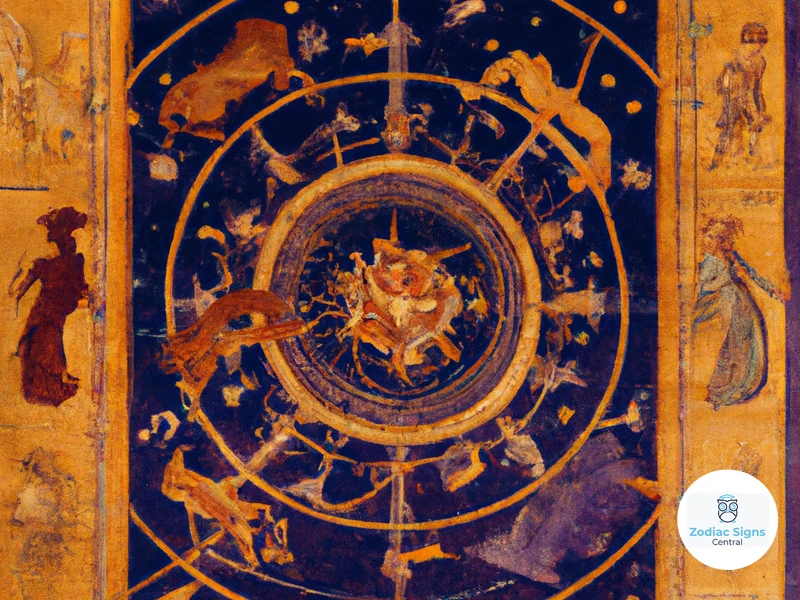
Ancient Romans employed various divination methods to seek guidance and gain insights into the future. One popular divination practice was augury, which involved interpreting the flight patterns and behaviors of birds as omens. Priestly experts called augurs would observe the birds and analyze their movements and sounds. Another method was haruspicy, where the entrails of sacrificed animals, typically sheep or chickens, were examined for signs and symbols. These signs were believed to hold messages from the gods and could provide predictions or guidance. Sortition, a form of divination using lots, was also common. It involved drawing lots to make decisions or determine outcomes. Additionally, the Romans practiced astragalomancy, a form of divination using sheep or goat knucklebones or dice. The bones would be thrown, and the resulting patterns or numbers would be interpreted for answers or predictions. These divination methods were deeply ingrained in Roman society and were used by both individuals seeking personal guidance and by leaders making important decisions for the empire’s fate.
Augury
Augury was a prominent divination method in ancient Rome, steeped in tradition and believed to provide insights into the will of the gods. Augurs were skilled practitioners who interpreted the flight patterns, calls, and behavior of birds to predict future events and make important decisions. They believed that birds were the messengers of the gods, and by observing their actions, they could obtain divine guidance. Augurs typically conducted their rituals in a sacred space called the templum, which was marked by a designated boundary. The augur would then observe the birds within this sacred space and interpret their movements and behaviors. For example, the direction of a bird’s flight, the types of birds encountered, and even the sounds they produced were all considered significant omens. Each bird species had its specific symbolism and meaning, with some birds being associated with good fortune while others indicated potential challenges or danger. The augur’s interpretations were highly valued, influencing important decisions in matters of state, warfare, and personal affairs. The practice of augury was deeply integrated into Roman society and continued to hold significance throughout the empire’s history.
Haruspicy
Haruspicy was a divination practice that held great significance in ancient Rome. It involved the examination of the entrails of sacrificed animals, particularly the liver, to gain insights into future events and determine the will of the gods. The haruspex, or diviner, would carefully observe the shape, color, and texture of the organs, as well as any abnormalities or omens present. They believed that the gods communicated their messages through these signs, and that the liver, in particular, was a sacred organ that held deep symbolic meaning. The haruspex would interpret the patterns and markings on the liver to make predictions and offer guidance. This practice was not limited to specific individuals but was also employed by the state for important matters such as determining the outcome of battles or making significant decisions. Haruspicy was often performed before major events and ceremonies, such as the appointment of new leaders or the declaration of war. It was a revered and respected form of divination that played a vital role in shaping the course of Roman society and governance.
Sortition
Sortition was a significant method of divination used in ancient Rome. It involved the selection of individuals through a random process to make decisions or predict outcomes. The Romans believed that this process allowed the gods to guide their choices and reveal their will. Sortition was often employed in situations where important decisions needed to be made, such as appointing leaders or deciding legal matters. The process usually involved using a random object, such as dice or slips of wood, to select individuals or determine the outcome of a particular event. The chosen individuals were believed to be influenced by divine intervention and thus capable of providing insights into the future or making unbiased decisions. This method of divination played a crucial role in ensuring fairness and impartiality in Roman society, as it removed biases and allowed for a more objective approach to decision-making. It was a unique form of divination that showcased the Romans’ belief in the divine influence in their everyday affairs.
Astragalomancy
Astragalomancy, also known as cleromancy, was a divination method commonly practiced in ancient Rome. It involved the casting of dice, specifically sheep’s knucklebones known as “astragali,” to gain insights into future events. The astragali had marked sides, and the patterns they formed upon landing determined the interpretation of the divination. Different sides of the astragali represented various outcomes or symbols that were associated with certain meanings. Roman diviners would roll the astragali and interpret the resulting pattern to provide guidance or predictions. The interpretation could vary based on the arrangement of the marked sides, the number of astragali, or their sequential order.
Astragalomancy was also used as a means of seeking approval or gaining answers from the deities. The Romans believed that the gods communicated through the casting of the astragali, utilizing their divine influence to guide the outcome. Each divination session was seen as an act of seeking divine intervention, and the results were considered indications of the gods’ will.
This method of divination was not limited to a single purpose. It had a wide range of applications, from personal matters such as love, marriage, and health, to more significant issues like politics, war, and the destiny of the empire. The complexity of the interpretation relied on the skill and expertise of the diviner, who would combine the patterns of the astragali with their knowledge of astrology and other divination methods to offer concise and insightful predictions.
Astragalomancy is an intriguing example of the divination practices prevalent in ancient Rome. It highlights the Romans’ belief in the interconnectedness of the physical and spiritual realms, as well as their reliance on various divination methods to understand and navigate the complexities of life. To this day, the study of ancient divination techniques like astragalomancy provides a window into the rich cultural and spiritual fabric of ancient Rome.
The Influence of Astrology on Daily Roman Life
The influence of astrology on daily Roman life was pervasive, shaping various aspects of society and individual decision-making. Astrology guided not only personal choices but also important events and political decisions. Romans consulted astrologers for advice on matters such as marriages, business ventures, and even military campaigns. They believed that by aligning their actions with the celestial movements and positions, they could enhance their chances of success and avoid unfavorable outcomes. Astrology played a significant role in relationships as well, with individuals considering zodiac compatibility when seeking potential partners. For instance, a person born under the sign of Virgo might consult a compatibility guide to understand how their traits align with those of other signs. This belief in astrological compatibility influenced the formation of personal and professional alliances, thus impacting the social fabric of ancient Roman society.
On a daily basis, individuals would consult their horoscopes to gain insights into what the stars had in store for them. These horoscopes provided guidance on various aspects of life, including health, career, relationships, and even travel. By following the advice outlined in their horoscopes, Romans believed they could make informed decisions and navigate life’s challenges more successfully. Daily horoscopes not only provided individuals with a sense of direction but also instilled a belief in the interconnectedness of the cosmos and human existence.
Astrology also had a significant impact on the calendar. The Romans devoted specific days to honor and worship the gods associated with each zodiac sign. For example, the month of March was believed to be under the influence of the god Mars, and festivals and celebrations would be conducted to honor him. These astrologically significant dates shaped the religious and social calendar of ancient Rome, contributing to the daily rituals and practices of its citizens. The integration of astrology into daily life highlights its pervasive influence and its importance in Roman society.
Astrology played a central role in the lives of the ancient Romans. It offered guidance, provided a sense of purpose, and influenced decision-making at personal, societal, and political levels. The belief in the power of the stars and their influence on daily life permeated every aspect of Roman society, leaving an indelible mark on their culture and worldview. Whether it was seeking compatibility with other signs or making important choices in life, astrology held a significant sway over the daily lives of the ancient Romans.
Types of Horoscopes in Ancient Rome
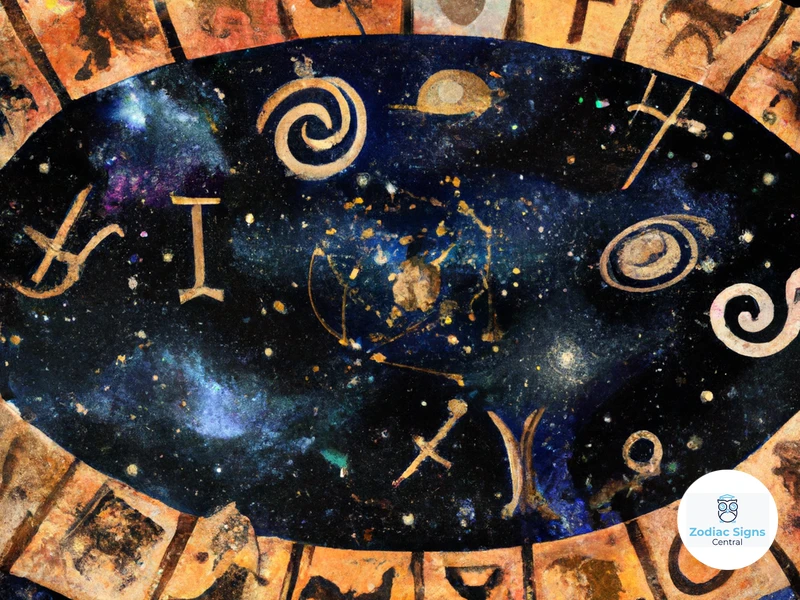
Astrology played a significant role in ancient Roman culture, and various types of horoscopes were used to gain insights into different aspects of life. One type of horoscope in ancient Rome was the birth horoscope, which was based on the exact time and location of an individual’s birth. This horoscope provided valuable information about a person’s personality traits, strengths, weaknesses, and potential future events. Daily horoscopes were also popular, offering guidance and predictions for each day based on the movements of the celestial bodies. These horoscopes were consulted to make decisions and plan activities in alignment with the stars. In addition to personal horoscopes, event horoscopes were used to analyze the astrological significance of important occasions, such as weddings, battles, or public ceremonies. Astrologers would create these event horoscopes to assess the outcome and potential impact based on the planetary alignments at that specific time. The different types of horoscopes in ancient Rome allowed individuals to tap into the celestial wisdom and navigate their lives in accordance with the cosmic forces that influenced their destiny.
Birth Horoscopes
Birth horoscopes were an integral part of ancient Roman astrology, believed to provide valuable insights into a person’s character and destiny. When an individual was born, the position of the planets and stars at that exact moment was recorded and analyzed to create their birth chart. This chart served as a roadmap of the individual’s life, outlining their strengths, weaknesses, and potential future experiences. The birth chart consisted of multiple elements, including the zodiac signs, planetary placements, and aspects between celestial bodies. Each of these components contributed to the interpretation of the person’s personality traits and life path.
Zodiac signs played a crucial role in birth horoscopes. The position of the sun in the zodiac at the time of birth determined an individual’s sun sign, which represented their core essence and basic identity. For example, someone born when the sun was in Virgo would have a practical and analytical nature, while a Leo would possess confidence and charisma. Additionally, the position of other planets, such as the moon, Mercury, and Venus, provided further insights into an individual’s emotional needs, communication style, and approach to relationships.
Roman astrologers would analyze the interactions between these celestial bodies, known as aspects. For instance, a strong aspect between the sun and Mars could indicate a person with a bold and assertive nature, while a challenging aspect might suggest a tendency towards conflict or aggression. By examining the birth horoscope, astrologers could provide individuals with guidance on important life matters, relationships, career paths that were in alignment with their cosmic influences, and potential challenges they may face.
It’s important to note that birth horoscopes were not viewed as fixed destinies but rather as blueprints for individuals to understand their inherent qualities and make informed choices throughout their lives. The insights gained from birth horoscopes were used to guide decision-making, highlight potential areas of growth or challenges, and foster self-awareness.
Birth horoscopes continue to captivate people’s interest in modern times, and many individuals still turn to astrology for self-exploration and guidance. The unique astrological traits associated with different signs can be seen in famous personalities born under those signs, such as the disciplined and detail-oriented nature of Virgos or the bold and adventurous spirit of Sagittarius [(source)](/famous-virgo-personalities-defining-traits/). Birth horoscopes offer a fascinating glimpse into the complex interplay between celestial energies and human existence, allowing individuals to better understand themselves and navigate life’s journey with greater self-awareness and purpose.
Daily Horoscopes
Daily horoscopes held a special place in ancient Roman society, providing individuals with guidance and insights into their daily lives. Roman astrologers would create horoscopes based on the positions of the celestial bodies at the time of an individual’s birth or a significant event. These horoscopes would then be used to make predictions and offer advice on how to navigate the challenges and opportunities of each day. Daily horoscopes were tailored to each zodiac sign, taking into account the unique characteristics and attributes associated with that sign. For example, a Leo may receive a horoscope highlighting their natural leadership skills and encouraging them to take charge and seize new opportunities. A Sagittarius, known for their adventurous nature, might receive a horoscope suggesting they embrace spontaneity and explore new horizons. The daily horoscopes served as a tool to help individuals make informed decisions and maximize their potential. They were consulted regularly to gain insights into various aspects of life, including relationships, career prospects, and personal well-being. While daily horoscopes in ancient Rome were not as widely accessible as they are today, they played a significant role in shaping the daily lives and actions of individuals, serving as a guiding light in an uncertain world.
Event Horoscopes
Event horoscopes were an important aspect of astrology in ancient Rome, focusing on the astrological interpretation of specific events and their potential outcomes. These horoscopes were created for significant events such as weddings, battles, coronations, and the founding of cities. The astrologer would analyze the positions of the planets and the zodiac signs at the time of the event to determine its astrological significance and potential consequences. The event horoscope was seen as a snapshot of the cosmic energies at that particular moment, providing insights into the possible outcomes and influences surrounding the event. Roman astrologers believed that by understanding the celestial influences at play, they could make more informed decisions and take appropriate actions to ensure favorable outcomes. Event horoscopes were not only used for individuals or specific occasions but were also consulted for important political and military strategies. Emperors and military leaders sought the guidance of astrologers to evaluate the astrological climate before making crucial decisions, such as initiating a war or signing a treaty. The alignment of the stars and planets was believed to hold valuable information about the success or failure of these ventures. In this way, event horoscopes played a vital role in shaping the course of important events in ancient Roman society.
Astrology and Roman Society
Astrology had a significant impact on Roman society, permeating various aspects of daily life and shaping the beliefs and actions of both individuals and the state. The Romans relied on astrologers and their interpretations to guide important decisions, from choosing auspicious dates for significant events like weddings or battles, to making political and military strategies. Emperors like Augustus and Claudius were known to consult astrologers regularly in order to gain insight into their reigns and ensure the favor of the gods. The Roman nobility also placed great importance on astrology, using it to navigate personal relationships and business ventures. Astrology even influenced religious practices, with the temple of Divus Augustus being built in alignment with the stars. The influence of astrology on Roman society was undeniable, intertwining the celestial realms with the affairs of mortals in a way that went beyond mere curiosity or entertainment. (Reference link: /chemistry-leo-sagittarius/)
Emperors and Astrology
Emperors in ancient Rome held a fascination with astrology and often turned to astrologers for guidance and insight. The belief in the influence of the stars on their reign and destiny was deeply ingrained in their rule. Emperors sought astrological predictions and advice on matters such as military campaigns, political decisions, and even personal matters. They believed that by aligning their actions with the movements of the celestial bodies, they could ensure success and avoid any potential pitfalls.
Many emperors, such as Emperor Augustus, Tiberius, and Caligula, had personal astrologers in their court who would interpret celestial signs and offer counsel. Astrologers were highly regarded and held great influence over political affairs, as their guidance was seen as essential to the success and stability of the empire.
It is said that Tiberius, the second emperor of Rome, was so devoted to astrology that he would read his horoscope every day before making any decisions. Caligula, known for his erratic behavior, would consult astrologers and make decisions based on their interpretations. Emperors would often plan important events and ceremonies based on auspicious astrological alignments to ensure their success.
While astrology played a significant role in the lives of emperors, there were also instances where they used it for political purposes. For example, Emperor Domitian, known for his authoritarian rule, used astrology as a means of control. He would publicly consult astrologers and make grandiose claims about his own divine destiny, bolstering his image and authority among the masses.
The relationship between emperors and astrology was intricate and multifaceted. Astrology provided emperors with a sense of guidance, control, and a means to legitimize their rule. The influence of astrology on emperors’ decision-making and the perception of their reign cannot be overlooked in understanding the dynamics of ancient Roman society. To explore other unique approaches to astrology, check out Celtic astrology and discover the intriguing system behind the Celtic zodiac.
Astrology and Roman Nobility
Astrology held a particularly influential role among the Roman nobility, serving as a tool for political strategy, decision-making, and even marriage alliances. The elite class firmly believed that the movements of celestial bodies could determine the fate of individuals and the empire itself. As a result, the Roman nobility heavily relied on astrologers for guidance and insight. Powerful families sought the services of astrologers to help them make important life decisions, choose auspicious dates for significant events, and predict political outcomes. Birth horoscopes played a crucial role in determining the destiny and future of noble children. The alignment of planets and stars at the time of birth was meticulously analyzed, with astrologers interpreting these celestial signs to predict the individual’s character, strengths, and weaknesses. Astrological compatibility was a significant consideration in arranging marriages among the Roman nobility. Families would consult astrological charts to ensure harmonious unions that would lead to prosperous and influential alliances. Astrology was not only a means of personal guidance but also a tool for maintaining and consolidating power within the Roman aristocracy. The nobility’s reliance on astrology underscores its significant impact on their decision-making processes and social relationships.
Astrology and Roman Religion
Astrology held a significant place in Roman religion, as the Romans believed that the celestial bodies and their movements were a direct reflection of the gods’ will. They considered astrology to be a sacred practice, intimately connected to the divine and a means of communicating with the gods. The Romans believed that the gods communicated their messages and influenced human affairs through celestial signs and omens. The position of planets, the movement of stars, and the appearance of comets and eclipses were all interpreted as divine messages and indications of future events. Astrologers acted as intermediaries between the gods and humans, using their knowledge of celestial patterns to decipher these messages and provide guidance to individuals and the state. The Roman religious calendar was closely tied to celestial events, with certain festivals and rituals aligned with the movements of the sun, moon, and planets. The Emperor Augustus, in particular, was known for his belief in astrology and its importance in maintaining the favor of the gods. Astrology was not considered a separate discipline from religion, but rather an integral part of the Roman religious framework, serving as a tool for divine communication and guidance.
Ancient Roman Astrologers and Diviners
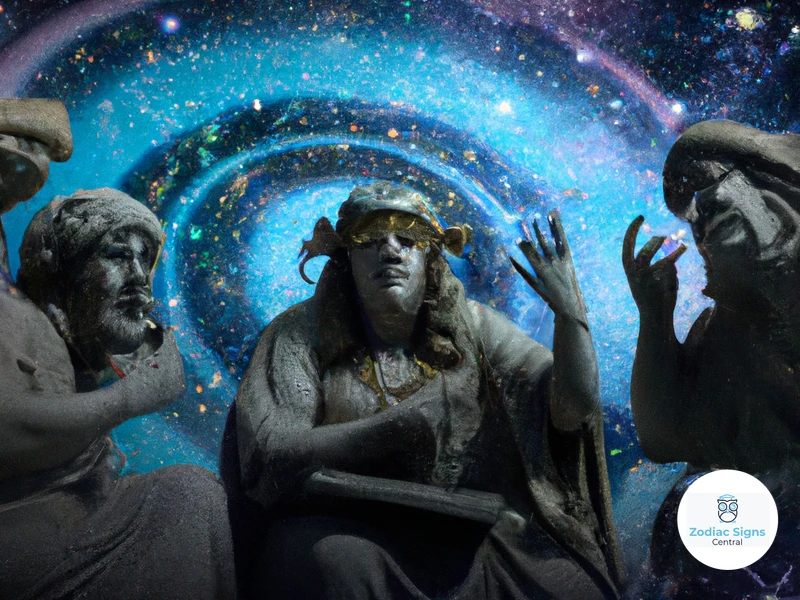
Ancient Rome was home to a plethora of skilled astrologers and diviners who played a crucial role in deciphering the secrets of the stars and unveiling the mysteries of the future. These individuals were highly respected and sought after for their knowledge and expertise. They would carefully study celestial charts, interpret omens, and analyze the positioning of the planets to make predictions and provide guidance to individuals and even the state. The advice and counsel of astrologers and diviners were sought in various aspects of life, from personal matters to matters of state. Astrologers would often hold influential positions, serving as trusted advisors to emperors, nobles, and even the general public. Their expertise extended beyond just astrology, as diviners would employ various methods such as reading entrails, studying the flight patterns of birds, or even interpreting dreams to foretell future events. The depth of their knowledge and their ability to connect the celestial and the terrestrial realms truly made them revered figures in ancient Roman society.
Debunking Myths and Misconceptions
Debunking myths and misconceptions regarding astrology and divination in ancient Rome is essential for understanding the true nature and significance of these practices. One common misconception is that ancient Romans believed astrology could determine every aspect of a person’s life. While astrology did hold great importance in Roman society, it was not considered the sole determining factor in one’s fate. The Romans believed in a combination of free will and destiny, understanding that individuals had the power to shape their own lives.
Another myth is that astrology in ancient Rome was solely a superstitious belief held by the ignorant masses. In reality, astrology was embraced by individuals from all walks of life, from emperors and nobility to philosophers and scholars. It was considered a complex and sophisticated field of study, requiring deep knowledge, mathematical calculations, and understanding of celestial phenomena.
It is often assumed that all astrologers and diviners in ancient Rome were frauds or charlatans. While there may have been individuals who sought to exploit the beliefs of others, there were also highly respected and skilled practitioners who dedicated their lives to the study of astrology. They used their expertise to provide guidance and insights, helping people make important decisions and navigate through life’s uncertainties.
It is important to approach the study of astrology and divination in ancient Rome with an open mind and without the bias of modern skepticism. While it may be tempting to dismiss these practices as mere superstitions, they carried significant cultural, social, and religious implications during that time. By debunking myths and misconceptions, we can truly appreciate the rich history and profound impact that astrology and divination had in shaping the ancient Roman civilization.
Decline of Astrology and Divination in Rome

The decline of astrology and divination in Rome can be attributed to several factors that emerged during the later years of the Roman Empire. One significant reason was the growing influence of Christianity, which viewed astrology as a form of pagan superstition and actively discouraged its practice. As Christianity gained more followers and became the official religion of the empire, the popularity of astrology waned. Additionally, the increasing skepticism and criticism of astrology by philosophers and intellectuals also contributed to its decline. Figures such as Cicero and Seneca questioned the validity of astrological predictions, arguing that human free will and virtue were more important in shaping one’s destiny. The decline of the Roman Empire itself and the political instability in the later centuries also played a role in the diminishing interest in astrology and divination. As the empire faced numerous challenges, including invasions and economic crises, people turned to more practical solutions and began to rely less on astrological guidance. The decline of astrology and divination in Rome marked a shift in societal beliefs and the rise of new worldviews that were less inclined towards supernatural explanations for events. However, the legacy of ancient Roman astrology and divination can still be seen today in modern astrology practices.
Modern Perspectives and Legacy
In modern times, astrology continues to captivate and intrigue many individuals who seek insight into their lives and the world around them. While the belief in astrology as a science has diminished, it still holds a place in contemporary culture and the minds of many. Today, astrology is often viewed as a tool for self-reflection and personal development rather than a definitive predictor of the future. Many people turn to astrology for guidance, seeking to understand their strengths, weaknesses, and life path based on their zodiac sign and birth chart.
Astrology has also found its place in popular culture, with the advent of horoscopes and astrology apps gaining popularity. These platforms provide daily horoscopes, compatibility readings, and personalized insights, catering to a wide audience. Astrology has made its mark in various artistic domains, with astrology-themed artworks, jewelry, and even fashion becoming trendy. The continued fascination with astrology illustrates its enduring legacy and the enduring human desire to seek meaning and connection in the universe.
In the field of psychology, some contemporary practitioners draw upon astrology as a tool for understanding personality and behavior. They explore the archetypes and symbolism associated with each zodiac sign, using them as frameworks for analysis and introspection. While these perspectives are not universally accepted within the scientific community, they demonstrate the ongoing influence and relevance of astrology in modern psychological thought.
The legacy of astrology also extends to the realm of astronomy. Many astronomical terms and concepts, such as the zodiac, are derived from ancient astrological traditions. Additionally, the study of celestial bodies and their movements continues to provide valuable scientific knowledge and contributes to our understanding of the universe.
While skepticism and scientific scrutiny persist, astrology remains a topic of fascination and exploration for many. Its cultural, psychological, and historical significance ensures its continued relevance in the modern world, providing a unique lens through which individuals can contemplate their lives and place in the cosmos.
Conclusion
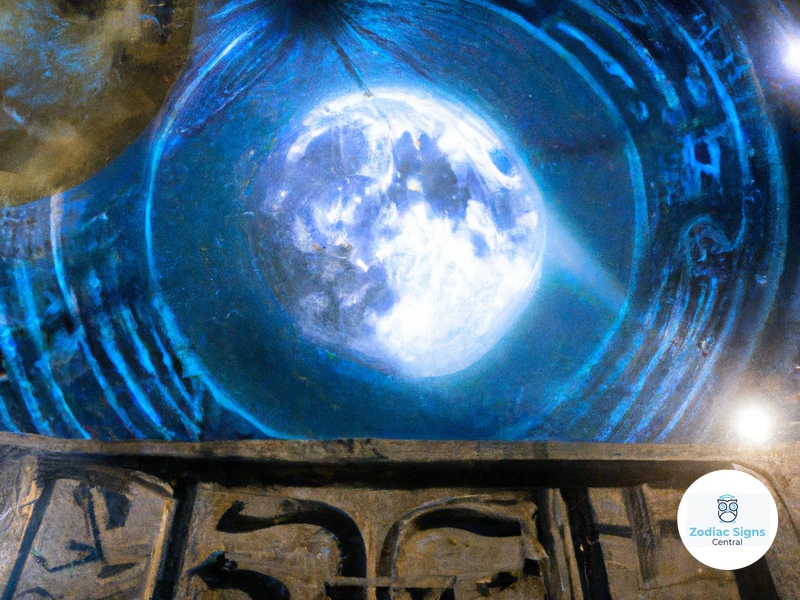
In conclusion, astrology and divination held a significant place in ancient Roman society, influencing everything from personal decisions to the destiny of the empire. The Romans believed that the positions and movements of celestial bodies had a direct impact on human affairs, and astrology was used as a means of understanding and predicting these influences. Astrologers played a vital role in interpreting birth charts, horoscopes, and celestial omens, providing guidance and insight into various aspects of life. Divination methods such as augury, haruspicy, sortition, and astragalomancy were also employed to gain further insights into the future and make important decisions. Although astrology declined in popularity with the rise of Christianity and the advance of scientific knowledge, its legacy can still be seen in modern horoscopes and astrology practices. The ancient Romans’ fascination with the stars and belief in their influence on human life continue to captivate and intrigue us today, reminding us of our eternal quest to understand the mysteries of the universe.
Frequently Asked Questions
1. What was the primary purpose of astrology in ancient Rome?
Astrology in ancient Rome served as a means to gain insights into various aspects of life, including personal fortunes, relationships, and the destiny of the empire itself. It was believed that the positions and movements of celestial bodies held significant influence over human affairs, and astrology was used to interpret and predict events.
2. How did the Romans associate zodiac signs with specific qualities?
The Romans associated each zodiac sign with specific elements, planets, and characteristics. These associations were based on observations and interpretations of the natural world and were used to symbolize and understand the qualities and traits associated with each sign.
3. Were astrology and divination considered legitimate practices in ancient Rome?
Astrology and divination were widely accepted and respected practices in ancient Rome. They played a significant role in shaping the lives and decisions of individuals, as well as influencing major events in Roman society. Astrologers and diviners held positions of importance and were consulted by people from all walks of life.
4. Did the Romans believe in a personal guardian spirit?
Yes, the Romans believed that each individual had a guardian spirit or genius. This spirit was determined by their birth chart and influenced their personality and fate. Astrology was used to understand and connect with this guardian spirit, allowing individuals to gain insights into their own unique qualities and traits.
5. How did the Romans view celestial phenomena like comets and eclipses?
The Romans considered celestial phenomena like comets and eclipses to be important omens or warnings from the gods. These events were believed to hold significance for both individuals and society as a whole. They were closely observed and interpreted by astrologers and diviners to provide insights into future events and potential outcomes.
6. Did astrology play a role in decision-making processes in ancient Rome?
Yes, astrology played a significant role in decision-making processes in ancient Rome. It was common for individuals to consult astrologers before making important decisions, such as starting a business, getting married, or going to war. Astrology provided guidance and insights into the potential outcomes of these decisions.
7. Were there any limitations to astrology in ancient Rome?
Astrology in ancient Rome, like any system of divination, had its limitations. It was not able to predict exact outcomes with certainty, but rather provided a framework for understanding and interpreting possibilities. Astrologers were aware of these limitations and acknowledged that free will and individual choices also played a role in shaping one’s destiny.
8. Were there specific rituals associated with astrology and divination in ancient Rome?
Yes, there were specific rituals associated with astrology and divination in ancient Rome. These rituals often involved offerings and prayers to the gods, as well as the careful observation and interpretation of celestial signs and omens. The rituals were seen as a way to connect with the divine and seek guidance in navigating life’s challenges.
9. Did ancient Roman astrology influence other cultures and civilizations?
Ancient Roman astrology had a significant influence on other cultures and civilizations. The Romans adopted and adapted many aspects of astrology from the Greeks and then spread their own interpretations and practices throughout their empire. These beliefs and practices subsequently influenced other societies, including those in Europe and the Middle East.
10. What led to the decline of astrology and divination in ancient Rome?
The rise of Christianity in the Roman Empire played a significant role in the decline of astrology and divination. As Christianity became the dominant religion, the practice of astrology was increasingly seen as incompatible with Christian beliefs. Additionally, the spread of scientific and rational thinking contributed to a decline in the popularity and acceptance of astrology during the later stages of the Roman Empire.
References
- Astrology in Ancient Rome: Poetry, Prophecy and Power
- The relationship of astrology with Roman state religion and …
Frequently Asked Questions
1. How did astrology influence the daily lives of ancient Romans?
Astrology played a significant role in the daily lives of ancient Romans. They believed that the movements of celestial bodies could offer insights into personal characteristics, relationships, and even influence important decisions.
2. What were the different types of horoscopes in ancient Rome?
Ancient Romans believed in various types of horoscopes, including birth horoscopes that determine an individual’s personality based on their birth chart, daily horoscopes that provide predictions for the day, and event horoscopes that determine the best time to undertake specific activities.
3. Who practiced astrology and divination in ancient Rome?
Astrology and divination were practiced by a range of individuals, including professional astrologers known as astrologers, aristocrats who sought guidance from astrologers, and even emperors who consulted astrologers for political decisions.
4. What were the popular divination methods used in ancient Rome?
Ancient Romans relied on various divination methods, including augury, which involved interpreting the flight patterns of birds, haruspicy, which involved examining the entrails of animals, sortition, which was a form of drawing lots, and astragalomancy, which involved dice divination.
5. How did astrology influence Roman society?
Astrology had a significant impact on Roman society. Emperors often used astrology to legitimize their rule, and the nobility relied on astrologers for insights into their future. Astrology was also closely linked to Roman religion, with specific gods associated with different celestial bodies.
6. Who were famous astrologers and diviners in ancient Rome?
Notable astrologers and diviners in ancient Rome included Publius Nigidius Figulus, who was renowned for his astrological knowledge, Lucius Tarutius Firmanus, whose predictions gained him a significant following, and Thrasyllus of Mendes, who served as astrologer to Emperor Tiberius.
7. What are some common astrological symbols and their significance?
Ancient Romans used various symbols in astrology, such as the sun symbolizing vitality, power, and leadership, the moon symbolizing intuition and emotions, and the planets like Mercury, Venus, Mars, Jupiter, and Saturn, each representing different aspects of life and personality traits.
8. How were astrological predictions made in ancient Rome?
Astrological predictions in ancient Rome were made using techniques like horary astrology, which answers specific questions based on the time of the inquiry, natal astrology, which examines a person’s birth chart, and mundane astrology, which predicts general events based on celestial movements.
9. Did ancient Romans use astrology for strategic planning?
Ancient Romans did indeed use astrology for strategic planning. They would consult astrologers to determine the most auspicious dates for battles, negotiations, and other important events to ensure the greatest chances of success.
10. Why did astrology and divination decline in ancient Rome?
As Christianity gained prominence in Rome, attitudes towards astrology and divination changed. The new religion saw these practices as pagan and superstitious, leading to the decline and eventual suppression of astrology and divination in Rome.
References
- Astrology in Ancient Greek and Roman Culture
- 6 Ancient Roman methods for predicting the future
- Astrology in Ancient Rome: Poetry, Prophecy and Power






